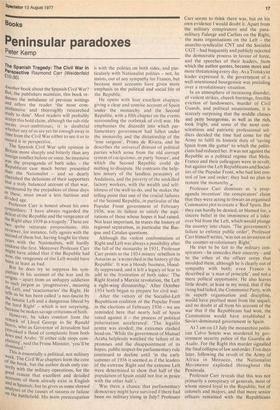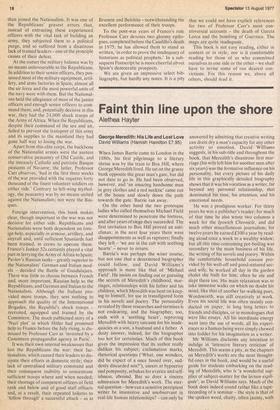Books
Peninsular paradoxes
Peter Kemp The Spanish Tragedy: The Chill War In Perspective Raymond Carr (Weidenfeld £10.00) Another book about the Spanish Civil War? But, the publishers maintain, this book redresses the imbalance of previous writings and offers the reader 'the most coinPrehensive and thoroughly researched study to date'. Most readers will probably accept this bold claim, although the sub-title seems over-ambitious; it is doubtful Whether any of us are yet far enough away in time from the Civil War either to see it or to record it in perspective. The Spanish Civil War split opinion in Britain more sharply and bitterly than any foreign conflict before or since. So intensive was the propaganda of both sides — the Republican' case much better presented than the Nationalist — and so dearly cherished the delusions of their supporters that a truly balanced account of that war, uncoloured by the prejudices of those days or these, must await a less factious and divided age.. Professor Carr is honest about his own sYmpathies: 'I have always regarded the defeat of the Republic and the vengeance of the Right after 1939 as a tragedy.' These are two quite separate propositions; this reviewer, for instance, fully agrees with the second of them but, having fought for three Years with the Nationalists, will hardly endorse the first. Moreover Professor Carr might have added that if the Republic had Iv, on, the vengeance of the Left would have been at least as bad.
But he does try to suppress his sympathies in his account of the 'war and its Origins — apart from an unhappy addiction such jargon as 'progressives', meaning
tile Left, and 'reactionaries' the Right. He tells us he has been called 'a neo-fascist by the lunatic Left and a dangerous liberal by ;Ile hard Right' — which is not surprising, tlecause he makes savage criticisms of both. 11°wever, he takes comfort from the _remark of Lloyd. George to Sir Ronald storrs, who as Governor of Jerusalem had I:rovoked a flood of complaints from both 'Jews and Arabs: 'If either side stops corn said the Prime Minister, 'you'll be dism issed.' This is essentially a political, not military work. The Civil War chapters form the core °f the book, but the author deals only eur s°111Y with the military operations, for the good reason that excellent and detailed accounts of them already exist in English and in Spanish; but he gives us some shrewd "alYses of the causes of success or failure on the battlefield. His Main preoccupation
is with the politics on both sides, and particularly with Nationalist politics — not, he insists, out of any sympathy for Franco, but because most accounts have given more emphasis to the political and social life of the Republic.
He opens with four excellent chapters giving a clear and concise account of Spain under the monarchy and the Second Republic, with a fifth chapter on the events surrounding the outbreak of civil war. He emphasises the discredit into which parliamentary government had fallen under the monarchy and the dictatorship of the 'iron surgeon', Primo .de Rivera, and he describes the universal distrust of political parties which arose from the old corrupt system ofcaciguismo, or party 'bosses', and which the Second Republic could do nothing to dissipate. He contrasts the helpless misery of the landless peasantry of Andalusia, and the poverty of the unskilled factory workers, with the wealth and selfishness of the well-to-do, and he makes the telling point that one of the crucial failures of the Second Republic, in particular of the Popular Front government of February 1936, was its failure to satisfy the aspirations of those whose hopes it had raised. Not least important, he traces the history of regional separatism, in particular the Basque and Catalan questions.
Although the violent confrontation of Right and Left was always a possibility after the fall of the monarchy in 1931, Professor Carr points to the 1934 miners' rebellion in Asturias as 'a watershed in the history of the Republic'. It was a bloody business, bloodily suppressed, and it left a legacy of fear to add to the frustration of both sides: 'The Right feared a Marxist revolution, the Left a right-wing dictatorship.' After October 1934 both began to prepare for civil war.
After the victory of the Socialist-Left Republican coalition of the Popular Front in the elections of February 1936 — we are reminded here that nearly half of Spain voted against it — the process of political polarisation accelerated: 'The legalist centre was eroded; the extremes clashed head-on.' While the government of Manuel Azaria helplessly watched the failure of its promises and the disappointment of its hopes, public respect for parliamentary rule continued to decline until 'in the early summer of 1936 it seemed as if the leaders of the extreme Right and the extreme Left were determined to show that half of the population of Spain could not live in peace with the other half:.
Was there a chance that parliamentary democracy might have survived if there had been no military rising in July? Professor Carr seems to think there was, but on his own evidence I would doubt it. Apart from the military conspirators and the paramilitary Falange and Carlists on the Right, the mass organisations on the Left — the anarcho-syndicalist CNT and the Socialist UGT— had frequently and publicly rejected the democratic process in favour of force, and the speeches of their leaders, from which the author quotes, became more and more threatening every day. As a Trotskyist leader expressed it, the government of a well-intentioned bourgeoisie was presiding over a revolutionary situation.
In an atmosphere of increasing disorder, of violent strikes, church burnings, forcible eviction of landowners, murder of Civil Guards, and political assassinations, it is scarcely surprising that the middle classes and petty bourgeoisie, as well as the rich, took fright, and some of the most conscientious and patriotic professional soldiers decided the time had come for the Army to fulfil its historic duty of 'saving Spain from the gutter' to which the politicians had reduced her. It was not against the Republic as a political regime that Mola, Franco and their colleagues were in revolt, but against the Left Republicans and Socialists of the Popular Front, who had lost control of law and order; they had no plan to restore the monarchy.
Professor Carr dismisses as 'a propaganda invention' the conspirators' claim that they were acting to thwart an organised Communist plot to create a 'Red' Spain. But • they can hardly be denied, or blamed for, a sincere belief in the imminence of a takeover bid from the Left, whicltwould plunge the Country into chaos. 'The government's failure to enforce public order', Professor Carr himself writes, 'was not an invention of the counter-revolutionary Right.'
He tries to be fair to the military conspirators — he concedes their sincerity — and
to the ethos of the officer corps that moulded them, although he is clearly out of sympathy with both; even Franco is described as 'a man of principle', and not a mere politcal opportunist. He also leaves little doubt, at least in my mind, that if the rising had failed, the Communist Party, with its superb organisation and discipline, wotild have profited most from the sequel; and no doubt at all from his account of the war that if the Republicans had won, the Communists would have established a Soviet-dominated government in Spain.
At 3 am on 13 July the monarchist politican Calvo Sotelo was murdered by government security police of the Guardia de Asalto. For the Right this murder signalled the final collapse of law and order. Five days later, following the revolt of the Army of Africa in Morocco, the Nationalist Movimento exploded throughout the Peninsula.
Professor Carr reveals that this was not primarily a conspiracy of generals, most of whom stayed loyal to the Republic, but of colonels and majors; and that more senior officers remained with the Republicans than joined the Nationalists. It was one of the Republicans' gravest errors that, instead of entrusting these experienced officers with the vital task of building an army, they subjected them to a political purge, and so suffered from a disastrous lack of trained leaders — one of the principle causes of their defeat.
At the outset the military balance was by no means unfavourable to the Republicans. In addition to their senior officers, they possessed.most of the military equipment, artillery, and arms factories in Spain; almost all the air force and the most powerful,un its of the navy were with them. But the Nationalists held the allegiance of most of the junior officers and enough senior officers to command them; and, potentially decisive in this war, they had the 24,000 shock troops of the Army of Africa. When the Republicans, despite their command of the sea and air, failed to prevent the transport of this army and its supplies to the mainland they had gone half way to losing the war.
' Apart from this elite corps, the backbone of the Nationalist armies were the austere conservative peasantry of Old Castile, and the intensely Catholic and patriotic Basque peasants of Navarre; the latter, Professor Carr observes, 'had in the first three weeks of the_war provided with the requetes forty thousand of the finest volunteer soldiers on either. side.' Contrary to left-wing mythology, the peasantry was by no means united against the Nationalists; nor were the Basques.
Foreign intervention, this book makes clear, though important in the war was not decisive for either side. Republicans and Nationalists were both dependent on foreign help, especially in armour, artillery, and aircraft and, until sufficient Spaniards had been trained, in crews to operate them. Franco's Junker 52s certainly played a vital part in ferrying the Army of Africa to Spain; Pavlov's Russian tanks —greatly superior to the Nationalists' German and Italian models — decided the Battle of Guadalajara. There was little to choose between French and, more important, Russian help to the Republicans, and German and Italian to the Nationalists. Although the Italians provided more troops, they sent nothing to approach the quality of the International Brigade9, the Republic's shock troops — recruited, equipped and trained by the Comintern. The much publicised story of a 'Nazi plot' in which Hitler had promised help to Franco before the July rising, is dismissed by Professor Carr as 'invented by a Comintern propagandist agency in Paris'.
It was their own internal weaknesses that lost the Republicans the war: their factionalism, which caused their leaders to dissipate their efforts in domestic strife; their lack of centralised military command and their consequent inability to concentrate sufficient troops where and when needed; their shortage of competent officers of field rank and below and of good staff officers and, as a result, their repeated failures to 'follow through' a successful attack — as at Brunete and Belchite — notwithstanding the excellent performance of their troops.
To the post-war years of Franco's rule Professor Carr devotes two gloomy epilogues, completed before the Caudillo's death in 1975; he has allowed them to stand as written, 'in order to prove the inadequacy of historians as political prophets.' In a subsequent Postscript he is more cheerful about Spain's democratic prospects.
We are given an impressive select bibliography, but hardly any notes. It is a pity that we could not have explicit references for two of Professor Carr's most contrbversial accounts — the death of Garcia Lorca and the bombing of Guernica. The maps are quite inadequate.
This book is not easy reading, either in content or in style; nor is it comfortable reading for those of us who committed ourselves to one side or the other — we shall have to revise some of our dearest convictions. For this reason we, above all others, should iead it. ,



































 Previous page
Previous page